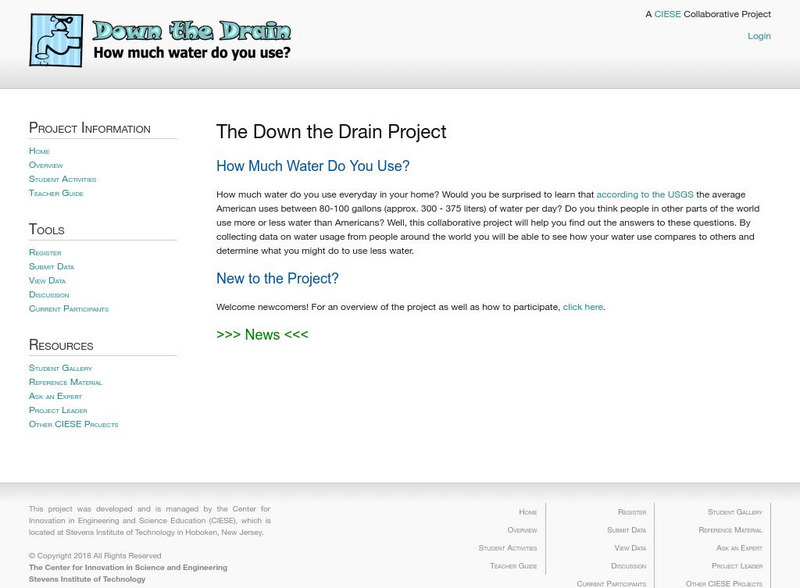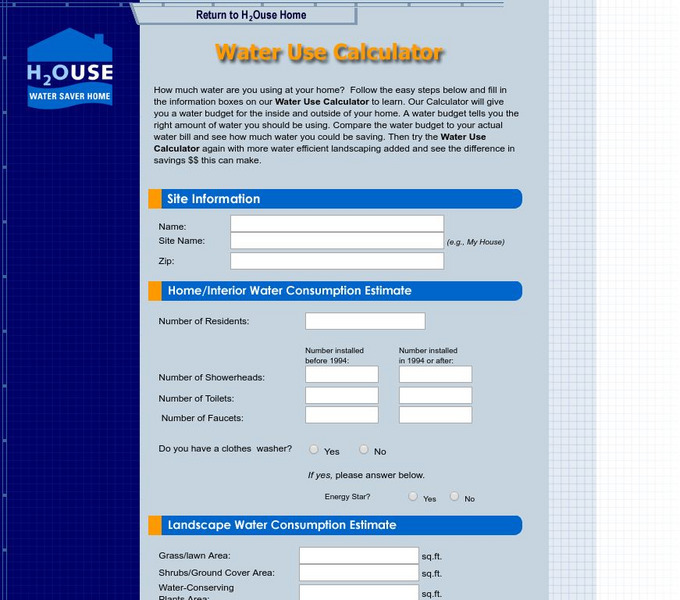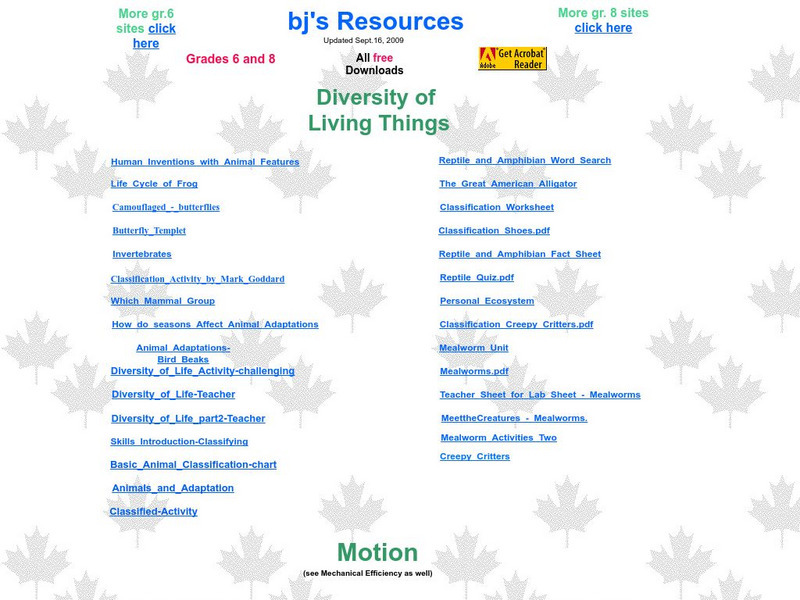Berkshire Museum
Where’s the Water?: Acting Out Science Cycles
Young scientists transform themselves into rivers, oceans, clouds, and drops of water in order to explore the water cycle. After assigning and explaining to learners their different roles in the activity, the teacher reads aloud a...
Curated OER
Water: From Neglect to Respect
The goal of this collection of lessons is to make middle schoolers more aware of the ways in which they are dependent upon water to maintain their standard of living. Learners compare water use in Lesotho to water use in the United...
Curated OER
Be Water Wise!
Rally your administration and facilities manager to let your class examine the water flow rates in different areas of the school. After the audit, the class researches opportunites for conserving water and writes a report or develops a...
Curated OER
WATER HERE AND THERE
Introduce the topic of water conservation with a little drama. Dressed as snowflakes, hail stones, or rain drops class members dramatize the events in a narration of the water cycle. The series of lessons that follow focus on...
Environmental Protection Agency (EPA)
Word Scramble
Practice vocabulary and key concepts in the basics of water conservation with a quick online fill-in-the-blank word scramble. Use the context of the sentence and the scrambled word to determine the correct word to complete the...
Curated OER
Water Facts: Conservation
How much water does the average person use? Provide an answer to this big question with the help of this slide show presentation. The amount of water used for specific daily tasks is shown alongside several simple conservation tips. Tip:...
Peace Corps
Weather and Water in Ghana
Students investigate the climate of their region. Students research statistics and conduct interviews. Students take a virtual tour of Ghana and discuss its climate. Students consider water conservation and the role it plays in both...
Curated OER
Water Sources in Cape Verde and West Africa
Learners analyze the importance of a fresh water supply in Cape Verde, researching five methods of obtaining and conserving water there. Learners create and present displays demonstrating their understanding of the methods of water...
Curated OER
Parched! No Water, No Town
Students discuss the benefits of water conservation. Given a data sheet, they document their water usage over a specified period. Water usage data is graphed and analyzed. Students discuss ways in which they can conserve water.
Curated OER
Fresh or Salty?
Students explore water bodies on the planet Earth and their various uses and qualities. They examine several ways that engineers are working to maintain and conserve water sources and think about their role in water conservation....
Curated OER
Desert Xeriscaping
Students recognize native species of desert vegetation while examining the need for water conservation. They design and create a xeriscape landscape using a variety of materials.
Curated OER
Water Conservation Task
Students list reasons that water conservation is important. They describe methods to conserve water. This lesson could be incorporated with an oral hygiene lesson on brushing teeth.
DOGO Media
Dogo News: California Governor Imposes Water Restrictions
Article reports on California Governor Jerry Brown's mandatory water restrictions resulting from the state's ongoing drought. Includes video.
Center for Innovation in Engineering and Science Education, Stevens Institute of Technology
Ciese: Down the Drain Project
Teachers can start this project at any time and no registration is required. Students collect data about water usage for themselves, their homes and their class. They analyze it, make predictions about it, and submit the data to the...
US Geological Survey
Usgs: Ground Water: Wells
Wells are extremely important to all societies. Find out how wells are dug today and peruse the list of the different types of wells and the methods used to dig them. Click Home to access the site in Spanish.
Other
California Urban Water Conservation Council: Water Use Calculator
Use this calculator to figure out how much water you are using at your home.
Science Buddies
Science Buddies:from Your John to the School Lawn:is Recycled Water Really Safe?
Find out whether reclaimed water is really safe by following the guidelines of the Science Buddies project.
My Science Site
Life Systems: Cells, Tissues, Organs
Extensive site for teachers provides some helpful resources that pertain to plant and animal cells. Includes a microscope diagram as well as plant, animal and pond labs. Also contains links to structures and mechanisms, matter and...
Other
Read Works: New York Buildings "Going Green" [Pdf]
An informational text about eco-friendly buildings in New York City. A question sheet is available to help students build skills in reading comprehension.
Better Planet Productions
Earth Care: Where's the Drip? [Pdf]
Kindergarten learners will learn about water conservation as they search for leaky taps and toilets.
Better Planet Productions
Earth Care: Just One Drop [Pdf]
For this lesson, Grade One students will discover how much water they use for daily activities and ways to reduce their water consumption.



















